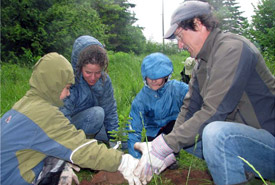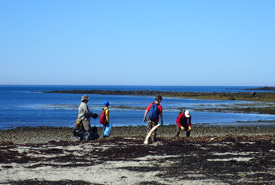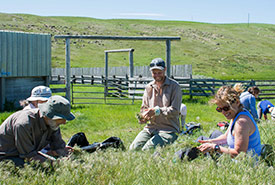4 mental health benefits of volunteering outside

Tree planting Conservation Volunteers event, Johnson's Mills, NB (Photo by NCC)
Research shows that spending time in nature benefits benefits us not only physically, but mentally. Just taking a walk in a forest can regulate blood pressure, lower the risk of illness, reduce stress and boost mental health. You may be surprised to learn that volunteering also has a positive effect on your mind.
So when you combine the two, getting outside and volunteering for conservation may be exactly what the doctor ordered to help improve your overall mental health. Check out these four mental health benefits of volunteering outside:
1. Reduce stress
Simply being outside in a natural environment has been shown to reduce stress and anxiety. Participating in physical activity in a city doesn’t have the same stress-reducing abilities as being active in nature. The Nature Conservancy of Canada's (NCC's) Conservation Volunteers (CV) events are held outside, on our properties. Whether it's a beach shoreline cleanup, grooming woodland trails or collecting native seeds in the grasslands, you’ll have the opportunity to relax in nature.
Related blog posts
2. Feel less isolated

Shoreline cleanup on Brier Island, NS (Photo by NCC)
Connecting with like-minded individuals through volunteering can reduce feelings of isolation. Attending events is an excellent way to make new friends and expand your social network. CV events are a great chance to get your hands dirty, learn restoration tips and tricks from long-time volunteers and become part of a welcoming community of nature lovers and restoration experts.
“I was impressed with the sense of community and the gathering of people with a common goal to contribute to the greater good of nature, wildlife and the environment.” – NCC volunteer
3. Boost your self-esteem
Participating in hands-on conservation initiatives can help you learn new skills and, in turn, allow you to contribute your knowledge to a project. Immersing yourself in an activity that requires your time and talents can provide a sense of accomplishment and boost your self-esteem. Whether it’s honing your birding skills or learning how to remove a barbed-wire fence, you’ll walk away from our CV events feeling good about what you’ve learned and accomplished.
“Volunteering for this event allowed me to see and learn about waterfowl in an Important Bird and Biodiversity Area, and contribute to long-term monitoring of the species using it. Not only did I learn, I obtained physical exercise and got outside, close to nature — something essential to my mental health.” – NCC volunteer
4. Improve your mood

Downey brome weed-pull event at Sandstone Ranch, AB (Photo by NCC)
Volunteering makes you feel better, as you contribute to a cause and a community. Research has shown that happy hormones and brain activity increase when volunteering. All of our volunteer events contribute to conservation action on the ground. You’ll be able to see first-hand your impact on the environment and your local community.
NCC's Conservation Volunteers program offers many opportunities to get outside and participate in hands-on conservation throughout the year. By taking part in a CV event, you’ll gain mental health benefits while supporting important work, on the ground.
“Conservation volunteerism is a good fit for me, being retired and trying to stay active and involved. Always the fresh air and new experiences in different settings make my day perfect. I have wonderful memories from it.” – NCC volunteer
Check out our calendar of Conservation Volunteers events to find a project near you.
This program has been made possible thanks to the support of Great-West Life, London Life and Canada Life, now the new Canada Life, the national sponsor of NCC’s Conservation Volunteers program.


